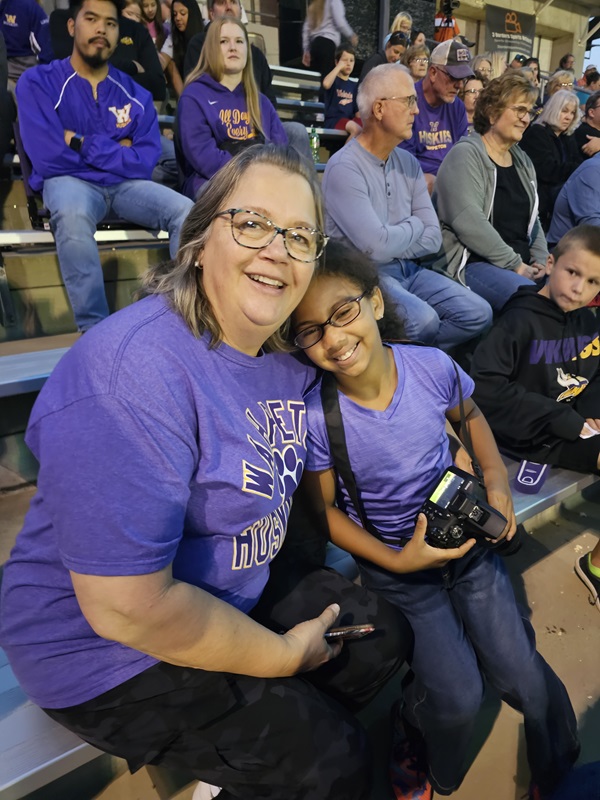
Richland-Wilkin Kinship Offers Youth a Helpful Hand, Guidance, and Support at Every Stage
Richland-Wilkin Kinship started out as a small outreach program, then blossomed into something much larger as the wider community recognized that their youth needed greater guidance and help. Since that time, this matchmaking mentorship program has grown and succeeded beyond all expectations, and the demand continues to grow. Kinship, we believe, has the heart and the will to help many more children, and in fact, there is a waiting list for children in need of mentors.
Kinship has done a remarkable job, improving academic performance, and noticeably increasing self-confidence in the children it serves. We believe that every child can benefit from a mentor, and the truth is that the mentors themselves benefit from the mentor-mentee relationship, which adds value to their lives, as they make a difference in their mentees’ lives. We’d like to see that waiting list of children shrink, and hope that our modest assistance through our Kars4Kids small grant program will help to do just that. We put some questions to Richland-Wilkin Kinship Assistant Director Marie Miller, to find out more about this work:
Kars4Kids: When was Kinship founded and why? Who was the founder and what can you tell us about the early days?
Marie Miller: Kinship originated in 1952 with a group of Luther Seminary students in St. Paul, MN. It was later formalized in 1954 at the Plymouth Youth Center, MN as a “Kinsmen Outreach” to inner city male youth. In 1963 “Kinswomen” was added, serving young females. During the 1970s a national director and advisory council was formed, and Kinship affiliates established with the majority located in the Upper Midwest.
In 1982, the Richland-Wilkin Kinship program began in Wahpeton, ND and is now a national affiliate. Local professionals serving in a volunteer capacity managed Kinship after identifying the need for a youth mentoring program in our community. Kinship operated under the Wahpeton Parks and Recreation umbrella for approximately 20 years until 2 local grants allowed for a part-time employee and the capacity to become its own 501(c)3 nonprofit. Our board consists of representatives from local schools, child welfare agencies, and community members who share our passion and mission for serving youth in our community through the power of mentoring. Rebekah Christensen began as the director of Kinship in 2006 and she operated the program out of her home while raising her 4 boys. In 2009, we began renting office space in downtown Wahpeton. The program has grown and expanded to meet the needs of community youth.
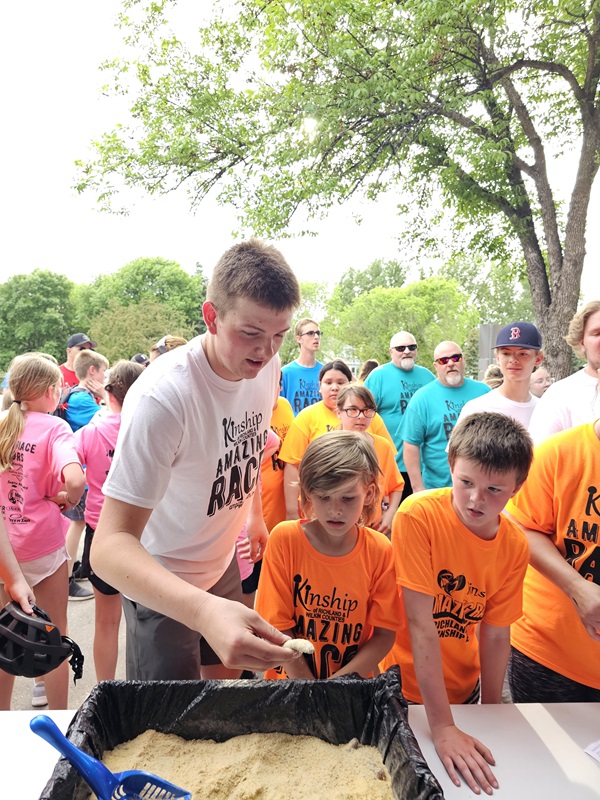
Kars4Kids: Can you tell us something about your community? Who does Kinship serve? How many children take part in your programs?
Marie Miller: Richland-Wilkin Kinship’s office is located in Wahpeton, ND in Richland County; just across the river is our “Twin Town” of Breckenridge, MN in Wilkin County. Wahpeton and Breckenridge are the largest cities in these two counties. We are primarily a farming community made up of smaller towns, surrounded by farmland. We are home to many manufacturing plants including farm and big machine equipment and factories that process sugar beets, sunflowers, and corn.
Families voluntarily seek out mentoring services for their child when they identify a need for extra support. The majority of our youth are not connected with other support systems or involved with extracurricular activities or faith organizations. Many are raised by one parent, grandparents, or are in out-of-home placement. We currently have 46 one-to-one community mentoring matches, with over 60 3rd through 5th graders in our Lunch Buddies program, and 22 teens enrolled in Kinship4Teens.
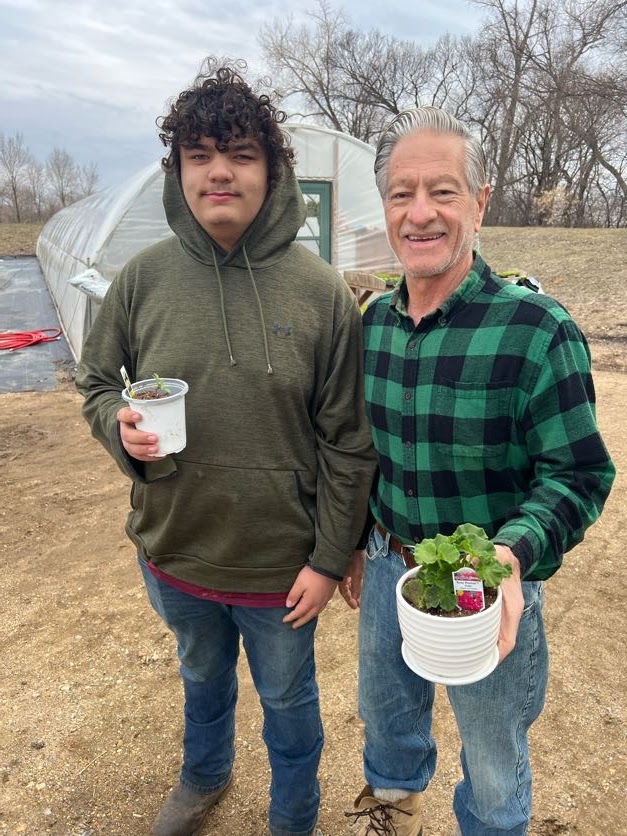
Kars4Kids: Tell us about “Lunch Buddies.” What’s the purpose of this program? Are the “buddies” volunteers? How often do they meet with students?
Marie Miller: Lunch Buddies is a school-based mentoring program designed to match an adult volunteer with an elementary-aged student to spend about 50 minutes together during their lunch period to eat, play a board game, or enjoy a craft/art activity. Lunch Buddies get together twice a month during the school year and students are always looking forward to it! This offers our community members the chance to make a difference for youth in a “mini-mentoring opportunity”. Many Lunch Buddy mentors are either professionals taking a lunch break, or retired individuals wanting to mentor children in a structured environment. A Kinship employee or the school’s Lunch Buddy liaison (both are active board members of Richland-Wilkin Kinship) are there to supervise and offer match support if needed.
The goal of this school-based mentoring program is to improve social skills and self-esteem to foster a better attitude for learning, with the ultimate goal of improving the students’ chances for school success. Every year, this program grows, based on the needs and demands of the students. Teachers and school counselors or administrators refer the students to the program. Some students self-refer as well upon learning about Lunch Buddies. Families are informed and educated on the program and must provide permission before youth can participate.
Students take pride in meeting their mentor at the school entrance, escorting them to the lunchroom, walking proudly together to the cafeteria and up to the designated Lunch Buddies gathering area. While they eat, they have time to catch up on the past 2 weeks, build rapport, and offer support when needed or celebrate their mentees’ recent successes. After eating, we provide a cart of games, markers, art books, and crafting kits for the students to share an activity or game.
Teachers report seeing improved attitudes, social skills, healthier friendships, and academic performance in students regularly participating in Lunch Buddies. We have reached 60 mentor matches within Lunch Buddies, serving two school districts. We are continuously recruiting more Lunch Buddies to expand the program based on need.
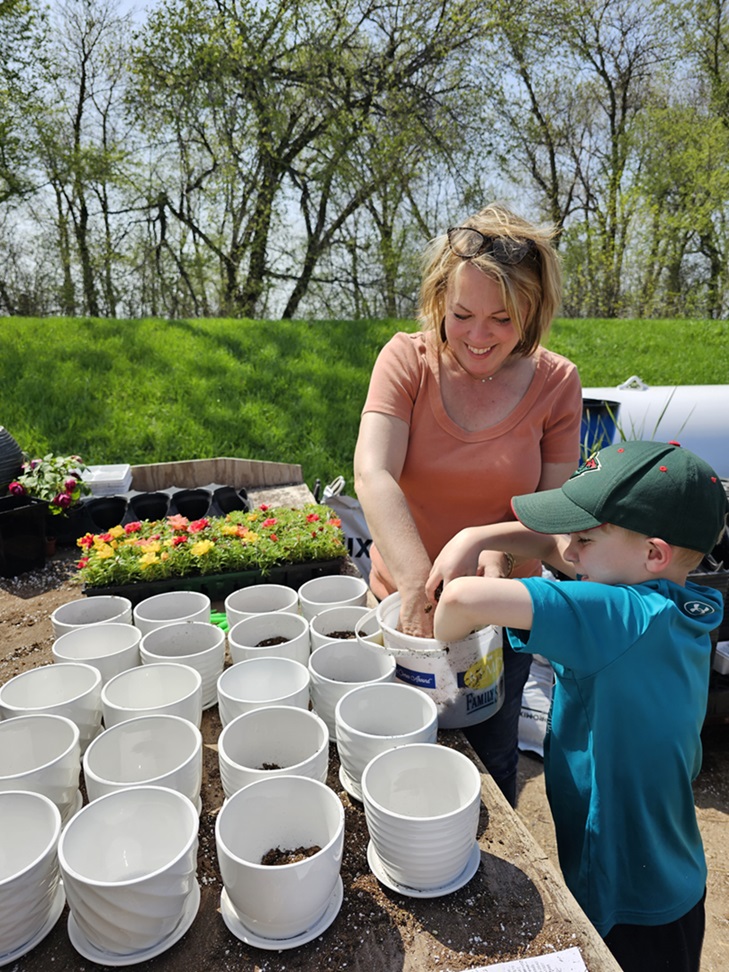
Kars4Kids: What is “Kinship4Teens?
Marie Miller: Kinship4Teens is our group mentoring program for youth ages 13 through 18 years old. We meet monthly and focus on independent living and intrapersonal communication skills with the goal of giving teens a support network, establishing and helping to achieve academic, social, or financial goals, while building the tools the children will need as they grow to adulthood.
Our curriculum is developed based on the participants’ needs. At the beginning of our group, we utilized the Casey’s Life Skills Assessment. Based on those areas of need, we are developing a curriculum to help the youth achieve their academic and personal goals, while offering independent living and intrapersonal skills education. We partner with community members, organizations, and businesses to provide opportunities, experiences, and education to our teens.
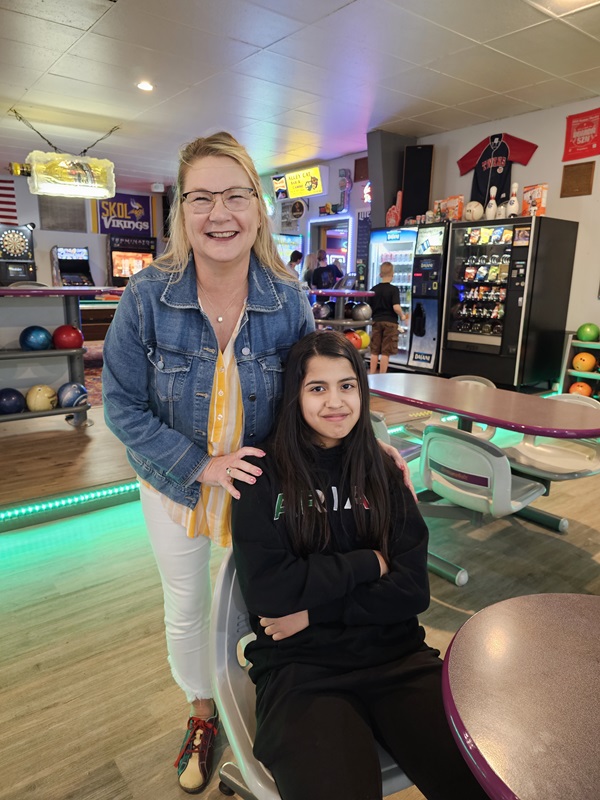
Kars4Kids: Can you give us an overview of Festival of the Trees? What role does Kinship play in the festival?
Marie Miller: Festival of the Trees highlights new, artificial Christmas Trees sponsored and decorated by community businesses, organizations, and families. The trees are displayed in Heritage Square, our town’s small downtown shopping center’s gathering space, and are up for the early shopping season. Kinship advertises and promotes the program for the purpose of collecting applications. Kinship reviews the applications, assigns a tree, and coordinates gifting the trees to the families or individuals who apply and who would not otherwise have a tree for the holiday season. This year we also held a winter hat, glove, and scarf collection for Kinship kids and a food donation for our local food pantry. We were able to give out hats, gloves and scarves to our kids at our Sledding & Ice Skating Activity in January to ensure everyone was warm.
Kars4Kids: Kinship states that “mentoring is prevention.” What does mentoring prevent?
Marie Miller: Today’s youth need a helpful hand, guidance, and support at every stage. Data shows that 1 in 3 of our nation’s kids are growing up without a mentor. Mentoring is proven prevention! Youth who meet regularly with their mentors are:
-46% less likely than their peers to start using illegal drugs
-27% less likely to start drinking
-55% less likely than their peers to skip school
-78% more likely to volunteer regularly
-130% more likely to hold leadership positions
-81% more likely to participate regularly in sports or extracurricular activities
At Kinship, we’ve seen that youth who are matched younger and exposed to more activities, opportunities, and community events through their mentoring relationships, are more likely to begin and actively participate in community extracurricular activities. A great example of this is the story we highlighted this year of Rylan and his mentor Jim. Rylan’s mom, Candace, felt that it would be great for Rylan to have some support and a positive role model, stating “We just don’t have a lot of people” outside the family. She said Rylan loves everything about Jim and they have lots of fun together. Candace appreciates Jim for getting Rylan into church again, “That is something we have not done since Rylan was little, and Rylan has gotten back to it with Jim.” Candace proudly said that Rylan was asked by the pastor to light the candles every Sunday and “Rylan loves it so much. It gives him a sense of belonging.”
Rylan radiated pride when speaking about this and the role he plays.
We have countless other examples of these success stories as mentors take youth to swimming lessons, musicals and theater productions, and sports camps, and youth have formed connections and have had ongoing involvement in these extracurricular activities.

Kars4Kids: You also serve the community at large through your Kinship Kloset (we’re loving all the Ks). Can you tell us something about this community service?
Marie Miller: Kinship Kloset was created when our local Walmart had a surplus of old clothing they were going to have to ship out, as it didn’t sell on clearance. A Walmart employee reached out to community volunteer groups and nonprofits on how keep this surplus local, as we have many low-income individuals that can use the items. A local church and Kinship partnered together to serve individuals and families, offering free new clothing to those in need. We served 727 individuals, supplying them with clothing and shoes for the summertime.
Kars4Kids: How many mentors do you have at present? What do you look for in a prospective mentor and what’s your “matchmaking” process?
Marie Miller: Our mission is to improve lives by establishing quality relationships between youth and caring mentors for the purpose of promoting stability, support, friendship, and community. Within our one-to-one community-based mentoring program we are serving 44 matches and 3 mentors in training. Our vision and goal is to help children thrive in their environment by encouraging a healthy lifestyle, developing coping skills, and building self-esteem. Mentors are individuals, couples, or families that are matched with youth ages 5 to 14. Our team of mentors are here to help a child achieve their potential and grow into a successful adult. Families who recognize the need and the benefits of a mentor for their child(ren/), fill out an application and survey of the child’s interests.
Kinship recruits, screens, trains, and supports volunteer mentors for one-to-one mentoring through friendship with a youth. A mentor must commit to a minimum of 4 hours a month, for one year, to mentor a child. During training, we interview the applicants to learn about their life, hobbies, interests, why they want to mentor, and what goals they have for themselves.
When a child is referred to the program, their parents are asked to fill out an interest and hobby form. This, in combination with getting to know the youth through school visits or our group activities (all waiting kids are invited to participate), we match children with mentors, based on similar interests, hobbies, stories, or experiences.
When mentors are processed, trained, and ready to move on to the match meeting, we invite the mentor, a carefully selected youth and their parent, and Kinship staff to sit down, get to know each other, learn more about Kinship, and the policies for parents, youth, and mentors. We offer all of them time to think about the match or ask if they are ready to move officially move forward with the match. We want all to feel heard and be comfortable with the mentoring match. At the match meeting, we also talk about any goals we have for the child, mentor, and family, and how we can work together to achieve these goals.
Mentors are asked to submit monthly reports on how things are going. Kinship provides support to matches, and monthly group activities for matched and waiting youth.
Kars4Kids: We understand you have a very small number of staff members at Kinship. How do you manage such an endeavor of this size with so few people on board to make it happen? Do you have what you need—staff, funding—to fulfil your mission? How is Kinship supported?
Marie Miller: Kinship is funded by grants, businesses, individuals, service clubs, school contributions, and our fundraisers. We have two paid part-time staff who wear all the hats from recruitment; assessment; training; case management; monthly event planning; the Kinship4Teens curriculum; board preparations; accounting/finances; fundraising efforts; promotions; facilities management; social media; website; and other marketing management.
We are grateful to live in a community that supports and amplifies mentoring and our important mission to affect positive change for our youth. Without them, we couldn’t do it! Our board members and mentors all serve on a volunteer basis. Our lunch buddies pay for their own lunches, or their employers sponsor their lunch. Our mentors are the heart of our program and in the trenches every week with the kids. We could not do what we do without them!
Kinship has a Business Partners Program that runs on a three-year commitment of a set financial donation. This saves our employees’ time that otherwise would have to be spent making repeated requests each year, funds our monthly activities, and provides financial grounding.
“Kinship’s Amazing Race” is our biggest annual fundraiser; 2024 will be the 18th year. The community support for this fundraiser is huge! Teams are made up of students, families, businesses, youth groups, athletic teams, and Kinship kids. The participants help to raise funds to cover the minimum race entry fee, and the proceeds support Kinship. The challenges, prizes, and expenses of this fundraiser are covered by event sponsors, all of which receive recognition on t-shirts, on our social media, website, and local newspaper.
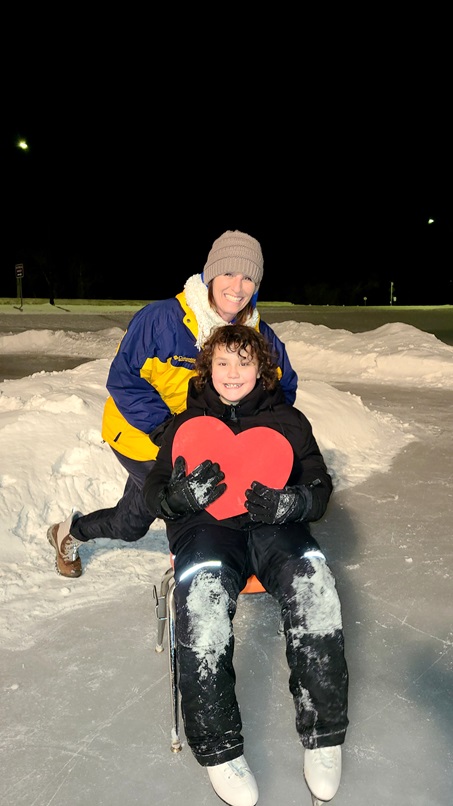
Kars4Kids: What’s next for Kinship?
Marie Miller: Kinship is always focused on recruiting mentors. It would be wonderful to see mentors waiting for kids to be referred to the program and no longer have “waiting kids” and instead have “waiting mentors.” We work toward maintaining a stable-giving foundation and ongoing financial support.
We are excited that our community is full of passionate, family-focused and economic development leaders, who have included Kinship in plans for a recreation and children’s play museum and a STEM center in development, that would offer access to Kinship and our matches. It would be great to have a year-round facility for matches to go to!
If we could wave a magic wand and have all the finances we need, we would love to be able to offer employees paid benefits and leave; cover the cost of our lunch buddy mentors’ lunch expenses; and offer more opportunities and scholarships for our youth to participate in extracurricular activities and summer camps. Another dream would be to have a ground level office and storage area within our community for mentors, youth, and community members to visit us; spend time together; and connect.